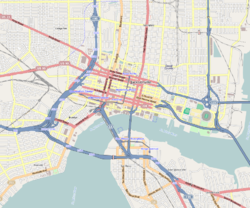The Museum of Science & History (MOSH) is a museum in Jacksonville, Florida. It is a private, non-profit institution located on the Southbank Riverwalk, and the city's most visited museum.[1] It specializes in science and local history exhibits. It features a large traveling exhibit that changes quarterly, three floors of permanent and signature exhibits, and the Bryan-Gooding Planetarium.[2][3]

| Established | 1941 |
|---|---|
| Location | Jacksonville, Florida |
| Coordinates | 30°19′10″N 81°39′36″W / 30.319525°N 81.659901°W |
| Public transit access | Bus: B7, CT3, SS6, SS8, SS35, SS50 Monorail: San Marco Station |
| Website | www |
American Alliance of Museums Accreditation, most recently achieved accreditation by the American Alliance of Museums (AAM) in 2011 and has been continually accredited since 1983.
History
editThe roots of MOSH go back to 1941 when the Jacksonville Children's Museum was chartered.[4] The first permanent home was a Victorian mansion in Riverside. Construction began on the current location downtown in 1965, and the facility opened in 1969. The Jacksonville Children's Museum became the Jacksonville Museum of Arts and Sciences in 1977 and six years later, they were accredited by the American Alliance of Museums. The name was changed to Museum of Science and History in 1988 and 37,500 square feet (3,480 m2) of space was added, including the planetarium then known as the Alexander Brest Planetarium. The last building renovation occurred in 1994 resulting in a total of 82,200 square feet (7,640 m2). In 2010 the Planetarium was upgraded with a new projector, sound system, and interior work, and renamed the Bryan-Gooding Planetarium.[3] In 2013, the museum opened a new core exhibit, JEA PowerPlay: Understanding Our Energy Choices and the newly renovated JEA Science Theater. In 2016, the museum opened another new core exhibit, Health in Motion: Discover What MOVES You, as well as a new outdoor sustainable landscape exhibit called JEA HydroLogic.[5]
In 2021, MOSH announced it would relocate to the Northbank of downtown Jacksonville with a new facility designed by architectural firm DLR Group.[6] The new facility would increase the museum's space from 77,000 to 133,000 SF.[7]
Core Exhibits
editThe Core Exhibits at MOSH include:
- Health in Motion
- Atlantic TAILS: Coastal Creatures of Northeast Florida
- JEA POWERPLAY
- JEA Science Theater - STEM-related activities
- Florida Naturalist's Center - Hands-on learning environment
- Currents of Time: A History of Jacksonville & Northeast Florida - History from the Timucuas to the 1960s
- Hixon Native Plant Courtyard - Northeast Florida native environment encouraging awareness and preservation of native species
- Space Science Gallery - Orientation space for the Bryan-Gooding Panetarium to learn about the innovation and history of space exploration
- Interpreting Northeast Florida: A Historic Mural by Elmer Grey
- Kidspace - Interactive exhibit for children under the age of 5
- Bryan-Gooding Planetarium - Multiple daily planetarium shows in one of the largest single-lens planetariums in the United States.[citation needed]
Previous Exhibits
editPrevious exhibits at Jacksonville’s museum of science and history include the new Playing With Lights exhibits.[8] This exhibit uses lasers to manipulate light. At twenty-one different stations, visitors can poke, prod, and bend light. The museum also offers light and laser shows within the exhibit multiple times a day. One exhibit that will always remain at the museum is the Jacksonville history exhibit. Located on the loft floor, the exhibit includes information about Jacksonville dating back around two hundred years. The Museum of Science and History also currently has the bicentennial exhibit[9] located on their third floor. This exhibit shows how events such as fires, floods, disease, and other monumental events have shaped Jacksonville's economy, environment, and future. This exhibit will be a portion of the already existing Current Time exhibit. Upcoming exhibits will include WeaveTales and a Jacksonville Shipwreck branch. WeaveTales[10] seeks to bring awareness to refugees and their families. The WeaveTales exhibit will include information pertaining to refugees within North Florida and highlight some women’s journey to Jacksonville. Previously shown at Jacksonville’s MOCA, the exhibit arrives at the city’s MOSH in May 2022. This exhibit will be available for a three-month period at the museum. The Jacksonville Shipwreck[11] branch will be located at the old shipyard in downtown Jacksonville. This location would include two and a half acres of history related to Jacksonville’s shipping industry. It would also include a river walk.
References
edit- ^ "About Jacksonville". www.coj.net.
- ^ Reiss, Sarah W. (2009). Insiders' Guide to Jacksonville (3rd ed.). Globe Pequot. pp. 82–83. ISBN 978-0-7627-5032-0. Retrieved September 15, 2011.
- ^ a b Charlie Patton (July 7, 2010). "Planetarium will be new star again at MOSH". The Florida Times-Union. Retrieved March 26, 2012.
- ^ "Design Renderings Revealed for the Museum of Science & History (MOSH)". DLR Group. Retrieved 2022-05-19.
- ^ "History". Jacksonville's Museum of Science and History. Retrieved 2019-08-02.
- ^ "The Museum of Science & History Selects DLR Group for MOSH Genesis Project". DLR Group. Retrieved 2022-05-19.
- ^ "Jacksonville's Museum of Science & History reveals exterior of future riverfront home". The Architect’s Newspaper. 2022-05-03. Retrieved 2022-05-19.
- ^ Rodriguez, Mekena (15 March 2022). "First Coast spring break ideas: Playing with lights at MOSH". First Coast News. Retrieved 22 March 2022.
- ^ Szaroleta, Tom. "LED lights, lasers and more: New Museum of Science & History exhibit sheds light on ... light". The Florida-Times Union. Jacksonville.com. Retrieved 22 March 2022.
- ^ Brown, Will. "Jacksonville-based WeaveTales works to integrate refugees through storytelling". Jacksonville Business Journal. The Business Journals. Retrieved 22 March 2022.
- ^ Powers, Frank (17 November 2021). "MOSH appears a step closer to Jacksonville Shipyards move". News4Jax. Retrieved 22 March 2022.
Media related to Museum of Science & History at Wikimedia Commons

